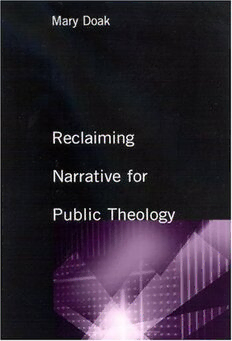
Reclaiming Narrative for Public Theology PDF
258 Pages·2004·0.887 MB·English
Most books are stored in the elastic cloud where traffic is expensive. For this reason, we have a limit on daily download.
Preview Reclaiming Narrative for Public Theology
Description:
This book furthers the development of American public theology by arguing for the importance of narrative to a theological interpretation of the nation’s social and political life. In contrast to both sectarian theologies that oppose a diverse public life and liberal theologies that have lost their distinctiveness, narrative public theology seeks an engaged yet critical role consistent with the separation of church and state and respectful of the multireligious character of the United States. Mary Doak argues for a public theology that focuses on the narrative imagination through which we envision our current circumstances and our hopes for the future. This theology sees both our national stories and our religious ones as resources that can contribute to a public and pluralistic conversation about the direction of society. Doak highlights arguments from Paul Ricoeur, Johann Baptist Metz, William Dean, Stanley Hauerwas, Franklin Gamwell, and Ronald Thiemann that can both contribute to and challenge a narrative public theology. She also proposes a model of public theology using narratives from Abraham Lincoln, Virgil Elizondo, and Delores Williams.
See more
The list of books you might like
Most books are stored in the elastic cloud where traffic is expensive. For this reason, we have a limit on daily download.
